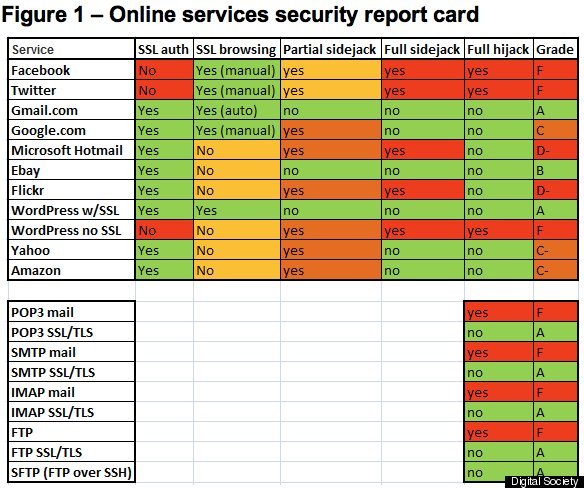
This past week Google and Facebook received less than stellar grades from Digital Society, a "digital think tank," which created an "Online Services Security Report Card" indicating the (in)ability of those and other sites to protect user information.

Considering the rich content that both companies (Google and Facebook) catalogue and leverage from their users for the benefit of their coffers and advertising partners alike, the vulnerability of their platforms to security breeches does not align with their best interests. What are the reasonable expectations that a user of social networking platforms can have with respect to their personal information beyond whether a website protects their information or not?
According to Hemu Nigam, former Chief Security Officer for News Corporation's online properties including Myspace, it's a question of transparency. Specifically, how transparent a company is about what they do with user information. Earlier this year Mr. Nigam founded SSP Blue, an advisory firm for online safety, security, and privacy challenges faced by corporations and governments, where he advises companies on those issues. He believes that social network platforms should take an "altruistic approach" on the topic of user information.
Mr. Nigam describes the relationship between the user, advertiser and (social network) platform as evolving. While he acknowledges that companies will continue to leverage user information for advertising opportunities, Mr. Nigam advocates user choice and control, which he characterizes as intertwined. For example, a platform can be transparent by allowing a user to opt in or out of the sharing of their data.
Yet remarks from Google's CEO, Eric Schmidt, about privacy have continued to fuel watchdog groups and provide late night fodder. He has even been quoted saying,
Google policy is to get right up to the creepy line and not cross it.
Hold your comments because in the same year Facebook's Mark Zuckerberg has made his own wave, if you will. While Aaron Sorkin immortalized him in The Social Network, Zuckerberg's own cavalier attitude toward privacy proved to all Facebook users that IM messages can come back to haunt anybody. Aside from out of pocket expenses to their public relations counsel for crisis management preps, these two men are LOL-ing their way to the bank because according to eMarketer, advertisers spent $6.15 billion on Internet ads in the third quarter of 2010.
With continued growth on the horizon how do these platforms reassure their users that they're doing the right thing and protecting their privacy? According to Mr. Nigam, we've seen a transition of the Internet from once a B-to-B, then B-to-C and increasingly a C-to-C medium. Sites and platforms are no longer concentrated into two or three main ones that users visit. Instead, consumers are sharing and interconnecting across a variety of platforms. In doing so, the shared experience among the users becomes the impetus for the platform itself to provide users with a positive experience. The challenge for these platforms becomes making sure that they follow the same protocol. Meaning that the user can expect that their privacy will be protected by site a in the same way that it will be when visiting site c. Mr. Nigam asserts that these discussions are occurring in the industry and they expect to weed out the bad platforms and present users with those that abide by industry-imposed policies.
The implications of how the social networking platforms choose to address the issue of privacy affects several relationships outside of the immediate user-advertiser-platform trifecta. For example, if users were to become distrusting of a particular platform and therefore leave, public relations professionals would advise their clients against including that platform in any promotional campaigns. That's because the association between a brand and the platform that it chooses to promote itself through go hand in hand. As the privacy issues are confronted by the industry, professionals in many areas will surely choose to follow only one decision-maker over all others: you, the user.
